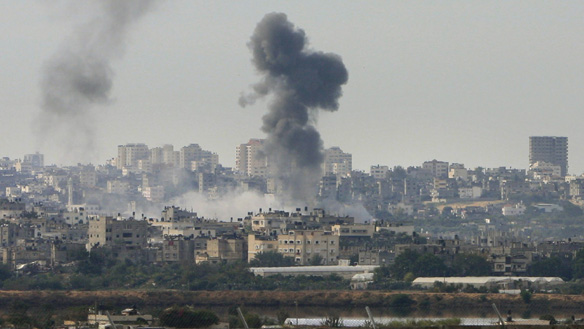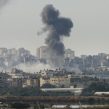Rocket Attacks from Lebanon Threaten Dangerous Escalation of Gaza War
Publication: Terrorism Focus Volume: 6 Issue: 1
By:

Israel’s invasion of Gaza and the ensuing humanitarian catastrophe has raised concerns about the potential for a dangerous escalation in regional hostilities. On January 8, three Katyusha rockets fired from southern Lebanon struck Nahariya, a city located in northern Israel, approximately 8 km from the Lebanese border. Many observers saw the attack as the first salvo in what may be the inevitable expansion of the conflict to Lebanon. No one has claimed responsibility for the attack, which caused minor injuries and property damage. Reports that militants launched a second barrage of rockets at Israel later proved to be unfounded (al-Jazeera [Qatar], January 8). In response, Israel retaliated by firing mortar rounds at the reported origin of the rocket fire, the Lebanese village of Tair Harfa, which is located in southern Lebanon approximately 7 km from the Israeli border. No injuries were reported from the attack. Residents of Tair Harfa did, however, flee the area out of fear of Israeli airstrikes (Daily Star [Beirut], January 9). A cache of non-operational rockets and a rocket launcher were also later discovered in the area (Daily Star, January 12).
Mystery continues to shroud the rocket attacks. Given its reputation for confronting Israel in defense of the Palestinians in both rhetoric and deed, as well as its dominant presence in southern Lebanon, it would seem likely that Hezbollah was responsible for the attacks. While pro-U.S. autocracies in the region remain silent or tacitly collude with Israel in its military campaign, there are widespread calls among the citizens of those same countries for action in support of the Palestinians, with many calling on Hezbollah to open a northern front against Israel as it did in July 2006 while Gaza was under attack. [1] The opening of a northern front and the expansion of the war to Lebanon would compel Israel to divert forces and attention away from Gaza, thus alleviating pressure on the Palestinians. It would also add pressure on the United States to restrain Israel. Despite its Shi’a Islamist pedigree and reports of a rise in sectarian tensions pitting Sunni versus Shi’a in the Middle East, Hezbollah is enjoying a groundswell of popular support in predominantly Sunni countries such as Egypt and Jordan and even among many minority Christians, who see the group as a legitimate nationalist movement (see Terrorism Focus, August 8, 2006). Many of Hezbollah’s opponents also see the group as a necessary evil born out of its successful resistance against Israeli occupation and Lebanon’s current lack of a credible military capable of defending its borders.
Following the rocket attacks, Hezbollah Secretary-General Hassan Nasrallah called for continued resistance against Israel while rebuking Arab countries such as Egypt and Jordan for maintaining relations with Israel during the crisis. He also praised Venezuelan president Hugo Chavez for expelling Israel’s ambassador to Caracas to protest Israel’s actions (al-Manar, January 7). [2] Nasrallah warned Israel to rethink any plans it might have of invading Lebanon, an apparent response to a violation of Lebanese airspace by Israeli jet fighters (al-Manar, January 9; Press TV [Iran], January 6). Despite Nasrallah’s fiery rhetoric, no hard evidence linking Hezbollah to the rocket attack has surfaced. Lebanese Labor Minister Muhammed Fneish, who represents Hezbollah in the Lebanese government, refuted claims implicating the group in the strike; “Everyone knows that Hezbollah does not shy away from claiming responsibility for its actions…When Hezbollah does something, it announces it, and has no problem doing so” (al-Manar, January 8). Hezbollah has also emphasized its commitment to adhering to UN Security Council Resolution 1701, which outlines the ceasefire agreement that ended the summer 2006 war between Hezbollah and Israel. While Hezbollah remains popular, it appears wary of engaging Israel in another costly campaign as Lebanon continues to rebuild after the 2006 summer war. Hezbollah also has its sights set on bolstering its political position in the upcoming parliamentary elections scheduled for May, making another war on Lebanese soil a risky proposition (Haaretz [Israel] January 6).
Sunni extremists inspired by al-Qaeda, including groups implicated in violence in Lebanon and elsewhere in the Levant – such as Fatah al-Islam (Victory of Islam), Jund al-Sham (Soldiers of the Levant), and Asbat al-Ansar (League of the Supporters) – have also been named as possible culprits in the rocket attacks (Christian Science Monitor, January 9). Sunni radicals in Lebanon are likely to see the Gaza conflict as an opportunity to bolster their position in a country where they enjoy little support compared to far more popular forces with an organic social base, such as Hezbollah. Al-Qaeda has also demonstrated a growing interest in expanding its presence in the Levant (see Terrorism Focus, December 12, 2008; Terrorism Focus, November 5, 2008).
Al-Qaeda deputy leader Dr. Ayman al-Zawahiri’s recent call for revenge against the United States and U.S. allies such as Egypt for cooperating with Israel may have prompted Sunni militants in Lebanon to act. [3] The extreme fringes of radical Sunni Islam detest Shia Muslims and Hezbollah, seeing them as essentially heretical. Sunni extremists in Lebanon may therefore consider the war in Gaza an opportunity to initiate a wider regional conflagration that would plunge their sworn enemies Hezbollah and Israel into a bloody conflict.
Residents of Lebanon’s impoverished Palestinian refugee camps – home to over 400,000 Palestinian refugees and an array of militant factions from radical Islamist to secular nationalist, such as the Popular Front for the Liberation of Palestine – General Command (PFLP-GC) – may also be behind the attacks. Palestinian militants in Lebanon may have felt compelled to show their solidarity for their besieged kin in Gaza. Palestinian refugee camps have also been used to launch rockets against Israel in the past. In light of this possibility, Hamas, Fatah, and other Palestinian factions deny responsibility for the attacks (Daily Star, January 9). Israeli sources indicate that they expected Palestinians in Lebanon to mount attacks against Israel from Lebanon at some point during the invasion (Haaretz, January 8; Daily Star, January 9).
Israel has suggested Ahmad Jibril’s Popular Front for the Liberation of Palestine – General Command (PFLP-GC) may be behind the rocket attack (Voice of Israel, January 8; al-Arabiya TV [Dubai], January 8). The Lebanese press cited local intelligence sources who described 15 vehicles entering the PFLP’s Qossaya base in the days before the rocket launch, as well as activity related to repositioning rocket launching pads. Although the Lebanese Army determined that the responsible parties were “not Lebanese,” this claim may represent an effort on its part to politicize the rocket attacks by implicating Palestinians for political gain (al-Liwaa [Beirut], January 9; Naharnet, January 9). A PFLP-GC spokesman refused to confirm or deny the group was firing rockets into Israel from southern Lebanon, but noted, “The war is open to all possibilities and it seems that it has no clear horizons amidst the absence of any tangible international will for preventing Israel from continuing its holocaust in Gaza.” The spokesman added that the war “could spill over to some Arab capitals” and “could lead to targeting U.S. interests” (Naharnet, January 8).
While the war in Gaza continues amid the growing civilian death toll for Palestinians, the possibility of the conflict spreading following future rocket attacks from Lebanon or even Syria against Israel is cause for serious concern. For now, Hezbollah appears keen on staying out of the conflict, despite growing pressure in many circles to engage Israel from the north. Hezbollah’s calculus may, however, change if and when Hamas loses its ability to resist Israel. The actions of radical Sunni extremists linked to al-Qaeda and other militants in Lebanon in particular also have the potential to set off a conflict between Hezbollah and Israel. The threat of a dangerous escalation of the war in Gaza will continue to increase if a cessation of hostilities remains out of reach.




